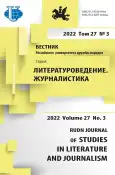Comparison as a means of persuasion and a technique of manipulation: features of application in media space
- Autores: Brusenskaya L.A.1, Belyaeva I.V.1
-
Afiliações:
- Rostov State University of Economics
- Edição: Volume 27, Nº 3 (2022)
- Páginas: 590-599
- Seção: JOURNALISM
- URL: https://journal-vniispk.ru/2312-9220/article/view/318948
- DOI: https://doi.org/10.22363/2312-9220-2022-27-3-590-599
- ID: 318948
Citar
Texto integral
Resumo
Manipulative techniques of verbal communication have rather recently moved into the focus of research attention (classical rhetoric was focused on honest argumentation and touched upon the problem of manipulation only in terms of criticism of “unsuitable persuasion techniques” used by sophists). In numerous modern studies, virtually the entire tropic is considered to be manipulative techniques, and it remains unclear what transforms the method of enhancing figurativeness and expressiveness into a destructive method of latent influence. Of course, this ambiguity is generated by the essence of the object: to explain manipulativeness, it is necessary to dive into the spheres of the intentional, which is difficult to verify. However, it is extremely important to distinguish between the tropics in its original role, on the one hand, and tropics used for manipulative purposes, on the other. Based on discursive analysis, which makes it possible to identify manipulation, using the inductive-deductive method and the method of linguopragmatic analysis, the authors study the conditions under which the use of linguistic means in general and the comparison trope in particular becomes manipulative. On the example of the trope comparison the authors attempt to clarify the conditions of its incorrect, it means manipulative, use. Manipulation is destructive, even if it bases on the tropics, and therefore for the cultivation of public space it is necessary to detect this technique.
Palavras-chave
Sobre autores
Ludmila Brusenskaya
Rostov State University of Economics
Autor responsável pela correspondência
Email: brusenskaya_l@mail.ru
ORCID ID: 0000-0003-3044-7033
Professor, Doctor of Philology, Professor of the Russian Language and Speech Culture Department
69 Bolshaya Sadovaya, Rostov-on-Don, 344038, Russian FederationIrina Belyaeva
Rostov State University of Economics
Email: irinabelyaeva23234@mail.ru
ORCID ID: 0000-0001-6350-8600
Doctor of Philology, Professor of the Russian Language and Speech Culture Department
69 Bolshaya Sadovaya, Rostov-on-Don, 344038, Russian FederationBibliografia
- Barnhill, A. (2014). What is manipulation? In C. Coons & M. Weber (Eds.), Manipulation: Theory and Practice (pp. 51–73). New York: Oxford University Press. http://doi.org/10.1093/acprof:oso/9780199338207.003.0003
- Baron, M. (2014). The men’s rea and moral status of manipulation. In C. Coons & M. Weber (Eds.), Manipulation: Theory and Practice (pp. 98–121). New York: Oxford University Press. http://doi.org/10.1093/acprof:oso/9780199338207.003.0005
- Belyaeva, I.V. (2009). The phenomenon of speech manipulation: Linguistic and legal aspects. Rostov-on-Done: Publishing House of North Caucasus Academy of Public Service. (In Russ.)
- Cave, E.M. (2014). Unsavory seduction and manipulation. In C. Coons & M. Weber (Eds.), Manipulation: Theory and Practice (pp. 176–201). New York: Oxford University Press. http://doi.org/10.1093/acprof:oso/9780199338207.003.0009
- Karamova, A.A. (2016). Manipulative potential of grammatical means in modern political discourse. Proceedings of Volga State University named after V.N. Tatishchev, 1(3), 84–90. (In Russ.)
- Kara-Murza, S.G. (2002). Manipulation of consciousness. Moscow: EKSMO-Press. (In Russ.)
- Karasik, V.I. (2015). Language spiral: Values, signs, motives. Volgograd: Paradigma Publ. (In Russ.)
- Khazagerov, G.G. (2006). Party, power and rhetoric. Moscow: Evropa Publ. (In Russ.)
- Klejberg, Yu. (2013). Epatage and manipulation: Concept and deviantological nature. Proceedings of the Moscow State University. Psychological Sciences, (4), 41–46.
- Kopnina, G.A. (2018). Countermanipulation in speech communication: Some perspectives of study. Communicative Research, (2), 7–19. (In Russ.)
- Kulikova, E.G. (2017). Verbal manipulation as a violation of ethical and speech norms. Humanities and Social Sciences, (3), 66–75. (In Russ.)
- Lobas, P.P. (2011). Tropics, synonymy, topic as a means of persuasion and manipulation (based on the material of socio-political texts). Abstract of PhD. Philol. Sci. Dis.Rostov-on-Don. (In Russ.)
- Manne, K. (2014). Non-Machiavellian manipulation and the opacity of motive. In C. Coons & M. Weber (Eds.), Manipulation: Theory and Practice (pp. 221–247). New York: Oxford University Press. http://doi.org/10.1093/acprof:oso/9780199338207.003.0011
- Mills, C. (2014). Manipulation as an aesthetic flaw. In C. Coons & M. Weber (Eds.), Manipulation: Theory and Practice (pp. 135–151). New York: Oxford University Press. http://doi.org/10.1093/acprof:oso/9780199338207.003.0007
- Morovov, D.V. (2016). Verbal means of manipulation in the Russian-language extremist text (based on the Runet material). Abstract of PhD. Philol. Sci. Dis. Nizhniy Novgorod. (In Russ.)
- Navasartyan, L.G. (2017). Linguistic means and speech techniques of manipulation by information in media (based on the material of Russian newspapers). PhD. Philol. Sci. Dis. Saratov. (In Russ.)
- Petrova, M.V. (2020). Speech counter manipulation in Russian-language video blogs. PhD. Philol. Sci. Dis. Krasnoyarsk. (In Russ.)
- Radbil, T.B. (2022). Manipulative potential of metalanguage comments in the language of modern Russian Internet media. Language and Speech on the Internet: Personality, Society, Communication, Culture: Proceedings of 6th International Scientific and Practical Conference (vol. 1, pp. 8–15). Moscow: RUDN University. (In Russ.)
- Rashkin, H., Choi, E., Yea Jang, J., Volkova, S., & Choi, Y. (2017). Truth of varying shades: Analyzing language in fake news and political fact-checking. Proceedings of the 2017 Conference on Empirical Methods in Natural Language Processing (pp. 2931–2937). Copenhagen: Association for Computational Linguistics. http://doi.org/10.18653/v1/D17-1317
- Shagbanova, H.S. (2020). Linguistic means of speech manipulation. Theories and Problems of Political Research, 9(5A), 72–80. (In Russ.)
- Wood, A.W. (2014). Coercion, manipulation, exploitation. In C. Coons & M. Weber (Eds.), Manipulation: Theory and Practice (pp. 17–51). New York: Oxford University Press. http://doi.org/10.1093/acprof:oso/9780199338207.003.0002
- Zapryagaeva, M.Ya., & Shishlyannikova, A.M. (2018). Techniques of verbal and nonverbal manipulative influence in TV communication (based on the material of the talk show “60 minutes”). Media Linguistics. Language in the Coordinates of Mass Media: Proceedings of 5th International Scientific Conference (issue 8, pp. 262–266). St. Petersburg: Mediapapir Publ. (In Russ.)
Arquivos suplementares









